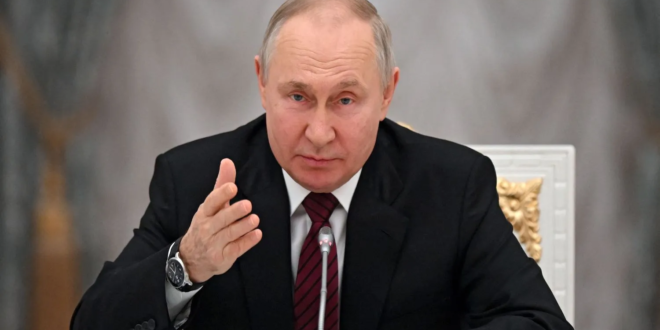Russian President Vladimir Putin and U.S. President Joe Biden delivered dueling speeches on Tuesday, each offering different visions of Russia’s war in Ukraine and world events more generally.
The main news from Putin’s sometimes rambling two-hour speech came toward the end: the suspension of New START, the last remaining nuclear arms control agreement between Russia and the United States. Russia’s enemies, Putin claimed, “want to inflict a strategic defeat on us and climb all over our nuclear facilities.”
The speech also repeated the Kremlin’s interpretation of history and Putin’s theory of the war’s origins. “I want to repeat: it was they who unleashed the war,” Putin said of the war he launched on Ukraine a year ago. “And we used and continue to use force to stop it.”
U.S. Secretary of State Antony Blinken called Putin’s decision to suspend Russian participation in the arms control agreement “deeply unfortunate and irresponsible,” while NATO head Jens Stoltenberg said it would make the world a more dangerous place and encouraged Putin to reverse course.
It is worth noting, however, that, according to a new survey by the European Council on Foreign Relations, while Russia’s war in Ukraine has united the west, the “western” narrative has not broken through in India—or, for that matter, Turkey or China; 77 percent of respondents in India believe Russia to be as strong as or stronger than it was before the war.
In Poland, where Biden was delivering his speech, Putin’s address was poorly received.
Bart Kot, Warsaw Security Forum program director described it as “A delusional performance … mostly intended to feed domestic audiences.”
“The NewSTART-related announcement may be regarded as another step in building nuclear fears in the West,” Kot wrote in an email to Foreign Policy. “What is worth noting was the direct comment on oligarchs and their assets in the West—a sign of rising isolationism of the regime, and a way of sending a message to business circles that Putin expects full loyalty.”
Biden, for his part, told those assembled at Warsaw Castle that “Kyiv stands strong.”
“Appetites of the autocrat cannot be appeased. They must be opposed. Autocrats only understand one word: No. No. No,” Biden said, adding that “democracies of the world have grown stronger, not weaker. But the autocrats in the world have gotten weaker, not stronger.”
“I thank @POTUS and all of America for their leadership in rallying the world in support of freedom and for their vital assistance to Ukraine. Together we are heading towards a common victory, and we must ensure it this year already,” tweeted Ukrainian President Volodymyr Zelensky following the speech.
“What is crucial for Poland is that it once again reaffirms the U.S. commitments to Europe’s defense and security, and [the] strategic importance of the U.S.-Polish partnership,” Kot noted. Although there was a regional focus, “What tends to be overlooked by Polish commentators is that the message has a global aspect—addressing the rising axis of the authoritarian powers, China included.”
“All in all, both speeches prove that the current war in Ukraine is a part of a greater confrontation of democratic world versus authoritarianism,” Kot wrote, “and that we should be prepared for a long fight to protect the most important values based on freedom.”
 Eurasia Press & News
Eurasia Press & News




